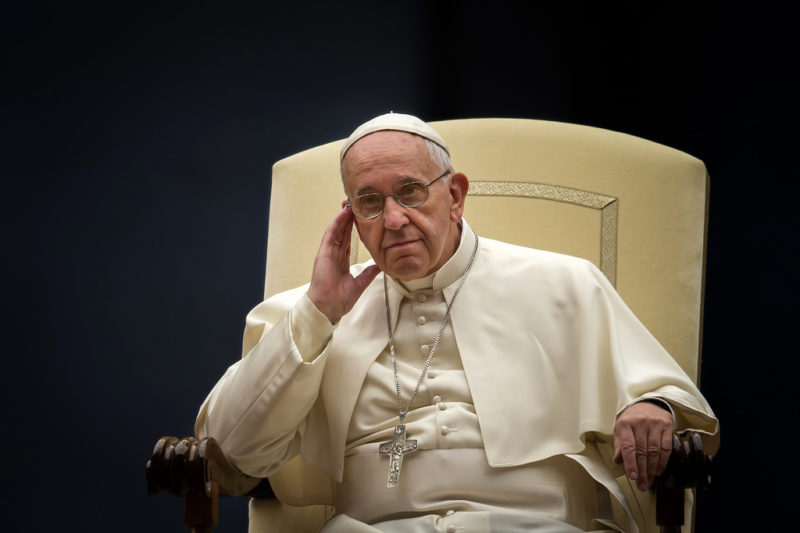Fatima Perspectives #1290
During his visit to Morocco, Pope Francis uttered the following sentiments: “Why do we feel sad? Because those who build walls will end up being prisoners of the walls they build…. [T]he builders of walls, whether made of barbed wire that cuts with knives or bricks, will become prisoners of the walls they make.”
The statement is nonsensical on its face: physical barriers to illegal immigration are in no sense, even metaphorical, an imprisonment of citizens and lawful permanent residents of the nations these barriers demark. The legal inhabitants of nations that enforce physical and legal barriers to immigration are no more self-imprisoned than is Francis, safe behind the forty-foot-high walls of the Vatican enclave whose immigration policy is the strictest in Europe if not the world. Francis here adopts one of the glittering clichés of a globalist polemic promoted by oligarchs who, just as he is, are well-protected from the adverse consequences to which common people are exposed through uncontrolled mass migration.
Now, it is easy enough to pluck the low hanging fruit of Francis’ hypocritical leftist demagoguery on immigration policy. Beneath the empty rhetoric, however, there is the nucleus of a legitimate moral concept: that the refugee, if he truly is a refugee, should be welcomed in the territory to which he has fled. But the unregulated admission of refugees is today impossible. All the more so the admission of those who are not the victims of persecution or natural disaster but rather mere opportunity-seekers who intend to funnel money from the host country back to the families they left behind. Witness, for example, the caravans of Latin American migrants seeking to charge the US border while proudly waving the flags of the countries they still consider home.
What makes unrestricted immigration impossible, indeed madness, today is the existence of the modern nation-state, which serves as a juridical container for rights and privileges administered by a central authority in each nation. No longer is all of Europe united by the bonds of faith that once constituted Christendom. No longer is government primarily a local affair, administered by vassals presided over by a king whose direct authority was sharply limited in comparison with today’s all-powerful central governments. No longer does a universal network of Catholic charity — hospitals, monasteries, convents and systematized almsgiving — preclude the need for such measures as the “poor laws” of 16th-century Protestant England, the first “welfare state” in the modern sense.
The Peace of Westphalia (1648) and the end of the so-called “wars of religion” solidified the division of Europe into Protestant and Catholic confessional states, with clearly demarked territories. This was followed, over the next century-and-a-half, by the “age of democratic revolution,” the overthrow of monarchy on the Continent (and its emasculation in England), and the rise of the post-Christian secular nation-state, now designated with a cartographic precision that guaranteed division and bloody conflict on a scale never before seen in Western history.
With national governments, no longer the Church, as the primary administrators of social assistance and societal privileges, financed by onerous personal taxation rather than tithes, what was once an exercise of charity toward the traveler has become an unsustainable societal burden. And with the mass migration of Muslims into countries whose once-Christian identity has been totally effaced and even declared illegal, unrestricted immigration is effectively a prescription for the Islamicization of post-Christian Europe and the rise of violence toward individual citizens who still consider themselves Christians.
In short, Francis’ gauzy notion of unrestricted immigration as a form of “welcoming” dictated by Christian charity is nothing but a recipe for disaster in a post-Christian Western world in which nation-states are hostile toward Christianity as a matter of law and immigration has devolved into a political weapon for the enforcement of that very hostility. Yet he seems not to notice the problem even though he resides behind massive fortifications erected precisely in response to a Muslim sack of Rome in the 9th century.
Francis perhaps has stumbled across the nucleus of a moral truth, but he seeks to apply it in the wrong century, when its operation can only produce evil outcomes. Nor would Francis ever consider anything like a restoration of the social order in which immigration represented the movement of Christians within Christendom, not excluding charity toward the non-Christian refugee. But that restoration is precisely what Our Lady of Fatima means by the triumph of Her Immaculate Heart.
Want to read more?
Latest Fatima Perspectives
Fatima Perspectives Archive




